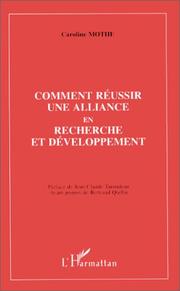| Listing 1 - 5 of 5 |
Sort by
|
Book
ISBN: 2717844929 9782717844924 Year: 2002 Publisher: Paris : Economica,
Abstract | Keywords | Export | Availability | Bookmark
 Loading...
Loading...Choose an application
- Reference Manager
- EndNote
- RefWorks (Direct export to RefWorks)
Organizational change --- Transaction costs. --- Changement organisationnel --- Frais de transaction --- Management --- Gestion --- Industries --- Size. --- Economy - Capitalism - Finance --- Economy - Capitalism - Finance. --- Entreprises --- Industries - Size.

ISBN: 2738449301 9782738449306 Year: 1997 Publisher: Paris: L'Harmattan,
Abstract | Keywords | Export | Availability | Bookmark
 Loading...
Loading...Choose an application
- Reference Manager
- EndNote
- RefWorks (Direct export to RefWorks)
Book
Year: 2022 Publisher: Cambridge, Mass. National Bureau of Economic Research
Abstract | Keywords | Export | Availability | Bookmark
 Loading...
Loading...Choose an application
- Reference Manager
- EndNote
- RefWorks (Direct export to RefWorks)
Substantial funding is provided to the healthcare systems of low-income countries. However, an important challenge is to ensure that this funding be used efficiently. This challenge is complicated by the fact that a large share of healthcare services in low-income countries is provided by non-profit health centers that often lack i) effective governance structures and ii) organizational know-how and adequate training. In this paper, we argue that the bundling of performance-based incentives with auditing and feedback (A&F) is a potential way to overcome these obstacles. First, the combination of feedback and performance-based incentives--that is, feedback joint with incentives to act on this feedback and achieve specific health outcomes--helps address the knowledge gap that may otherwise undermine performance-based incentives. Second, coupling feedback with auditing helps ensure that the information underlying the feedback is reliable--a prerequisite for effective feedback. To examine the effectiveness of this bundle, we use data from a randomized governance program conducted in the Democratic Republic of Congo. Within the program, a set of health centers were randomly assigned to a "governance treatment" that consisted of performance-based incentives combined with A&F, while others were not. Consistent with our prediction, we find that the governance treatment led to i) higher operating efficiency and ii) improvements in health outcomes. Furthermore, we find that funding is not a substitute for the governance treatment--health centers that only receive funding increase their scale, but do not show improvements in operating efficiency nor health outcomes.
Book

ISBN: 2271128633 Year: 2021 Publisher: Paris : CNRS Éditions,
Abstract | Keywords | Export | Availability | Bookmark
 Loading...
Loading...Choose an application
- Reference Manager
- EndNote
- RefWorks (Direct export to RefWorks)
Les journaux consacres à la vie de l’entreprise et aux activités industrielles soulignent depuis plusieurs années les nombreux accords et alliances qui se nouent entre les firmes. L’objectif de ces coopérations entre les entreprises est principalement de répondre aux incertitudes engendrées par les mutations concurrentielles et réglementaires et par l’émergence des nouvelles technologies. Ce qui est devenu aujourd’hui l’un des éléments clé des stratégies des entreprises et des groupes industriels pour mieux intégrer leur environnement pose cependant des problèmes encore mal résolus par l’analyse économique de l’industrie. En particulier, ces pratiques sont encore trop souvent considérées comme restrictives de la concurrence et de nature à provoquer une allocation de ressources moins satisfaisante pour le bien-être social. Cet ouvrage, réalisé par un groupe de chercheurs spécialisés dans l’économie des liaisons industrielles, présente des propositions nouvelles pour l’analyse économique de la coopération entre les firmes. Celle-ci est considérée comme une forme particulière d’agencement institutionnel dont il est possible d’étudier l’efficience et la viabilité. Différents angles d’approche de la question sont abordés : contrats de coopération, création de ressources et de compétences, réseaux d’entreprises, quasi-intégration des activités productives, coproduction de services, processus de création d’activités et de produits nouveaux.
Strategic alliances (Business) --- Cooperation. --- Collaborative economy --- Cooperative distribution --- Cooperative movement --- Distribution, Cooperative --- Peer-to-peer economy --- Sharing economy --- Economics --- Profit-sharing --- Alliances in business --- Business alliances, Strategic --- Corporate alliances --- Strategic business alliances --- Strategic corporate alliances --- Strategic partnerships (Business) --- Partnership --- Business networks --- économie --- compétences --- stratégie --- contrats de coopération --- création de ressources --- réseaux d’entreprises
Book

ISBN: 2100083147 9782100083145 Year: 2005 Publisher: Paris : Dunod,
Abstract | Keywords | Export | Availability | Bookmark
 Loading...
Loading...Choose an application
- Reference Manager
- EndNote
- RefWorks (Direct export to RefWorks)
Strategic planning --- Industrial organization --- Organizational behavior --- gestion de l'entreprise --- stratégie de l'entreprise --- veille stratégique --- concurrence --- organisation de l'entreprise --- structure de l'entreprise --- management stratégique --- décision --- culture d'entreprise --- développement durable --- stratégie collective
| Listing 1 - 5 of 5 |
Sort by
|

 Search
Search Feedback
Feedback About UniCat
About UniCat  Help
Help News
News